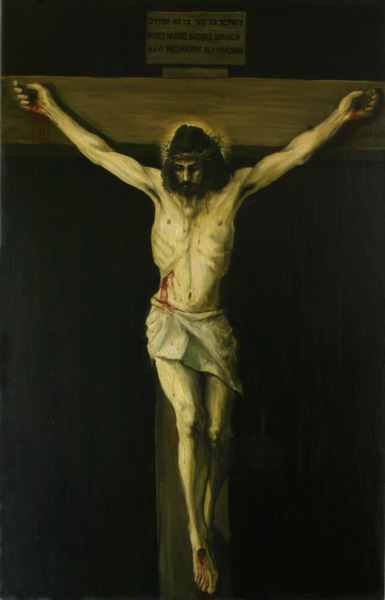
The greatest thirst of Jesus on the Cross was His thirst for souls. He saw then the graces and inspirations He would give me to save souls for Him. In what way shall I correspond and console my Saviour?
COMMENT: Once again, there are so many things that one could meditate on today. The Passion is a rich and inexhaustible source of meditation for us. It has converted many souls and formed great saints. St Teresa of Avila, for instance, lead a relatively mediocre religious life until one day she reflected on an image of Jesus being scourged at the pillar and was deeply transformed by the experience.
Today’s quote from Fr Doyle focuses on the thirst of Jesus on the cross. Reflecting on this thirst has had a powerful effect on many saints, and specifically on the life and spirituality of Blessed Teresa of Calcutta. As St John Paul II said at her beatification:
The cry of Jesus on the Cross, “I thirst” (Jn 19: 28), expressing the depth of God’s longing for man, penetrated Mother Teresa’s soul and found fertile soil in her heart. Satiating Jesus’ thirst for love and for souls in union with Mary, the Mother of Jesus, had become the sole aim of Mother Teresa’s existence and the inner force that drew her out of herself and made her “run in haste” across the globe to labour for the salvation and the sanctification of the poorest of the poor.
Certainly it was a physical thirst, after all of the exertions and torture and loss of blood of the preceding several hours. But the thirst was also spiritual in nature. St Josemaria Escriva tells us:
He thirsts for us, for our love, for our souls and for all the souls we ought to be bringing to him, along the way of the Cross which is the way to immortality and heavenly glory.
The Jesuit writer Luis de la Palma (1559- 1641) suggests that the thirst of Jesus was both a thirst for us, but also a thirst for more suffering:
What you did, Lord, was crazy; it was as if someone, having drunk the water of an entire river, claimed to be still thirsty. So surprising and marvellous is your desire to suffer for love of us.
From the 19th century book “The School of Jesus Crucified” by Fr Ignatius, an Italian Passionist priest, we find the following reflections on the thirst of Jesus:
Besides this corporal thirst, Jesus suffers from another spiritual species of thirst, which cannot be so easily assuaged.
Jesus thirsts for our eternal salvation, He thirsts for souls. This is the thirst of which he complains, and which is consuming His very life’s Blood. Jesus most passionately desires that the Blood He has shed should benefit mankind by saving them from Hell; and yet He foreknows that there will be many eternally lost, notwithstanding all His love and all His sufferings. Oh, truly does this thirst consume the loving Heart of Jesus, and its sacred heat slowly but surely deprives Him of life!
If thou hadst been present on Mount Calvary, and hadst heard our Redeemer saying ‘I thirst’ wouldst thou not have relieved His sufferings by giving Him a little water? Know that even at the present moment it is in thy power to relieve His burning thirst. He says to thee from the Cross, ‘My son, I thirst for thy soul.’
We will conclude today with the following private reflection from Fr Doyle’s notes. This very personal record was not meant to be seen by others, and it is all the more significant because of the slight tinge of Jansenism affecting the Church, including the Church in Ireland, at that time. One of the effects of the Jansenist heresy is to diminish our love for God, to make us feel unworthy of His love, and to make us overly austere and focussed on rules. Aspects of this error worked itself out in very damaging ways as the 20th Century progressed. Of course, it is also possible for the pendulum to swing too far in the opposite direction as an excessive reaction against the errors of the past… In any event, it is clear from this reflection that Fr Doyle was not affected by this error
I…once more had an opportunity of a quiet prayer before the life-size crucifix in the church which I love so much. I could not remain at His feet but climbed up until both arms were around His neck. The Figure seemed almost to live, and I think I loved Him then, for it was borne in upon me how abandoned and suffering and broken-hearted He was. It seemed to console Him when I kissed His eyes and pallid cheeks and swollen lips, and as I clung to Him, I knew He had won the victory, and I gave Him all He asked.
Perhaps today we may find this outpouring of love to be a bit excessive. But then again, Fr Doyle was called to an excessive love; to that greatest of loves which involves laying down one’s life for others. In this, he imitated his Master to the very end.
